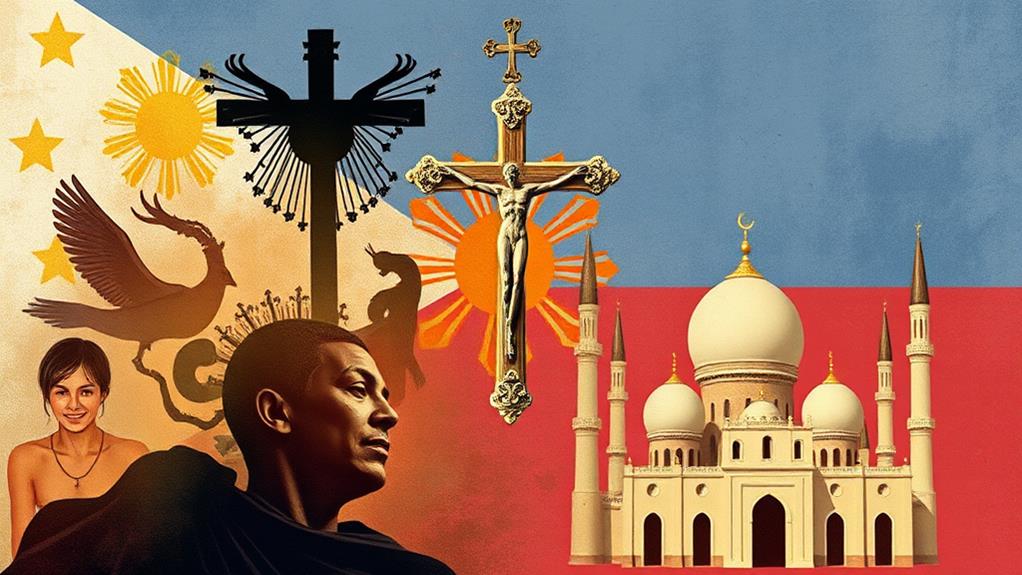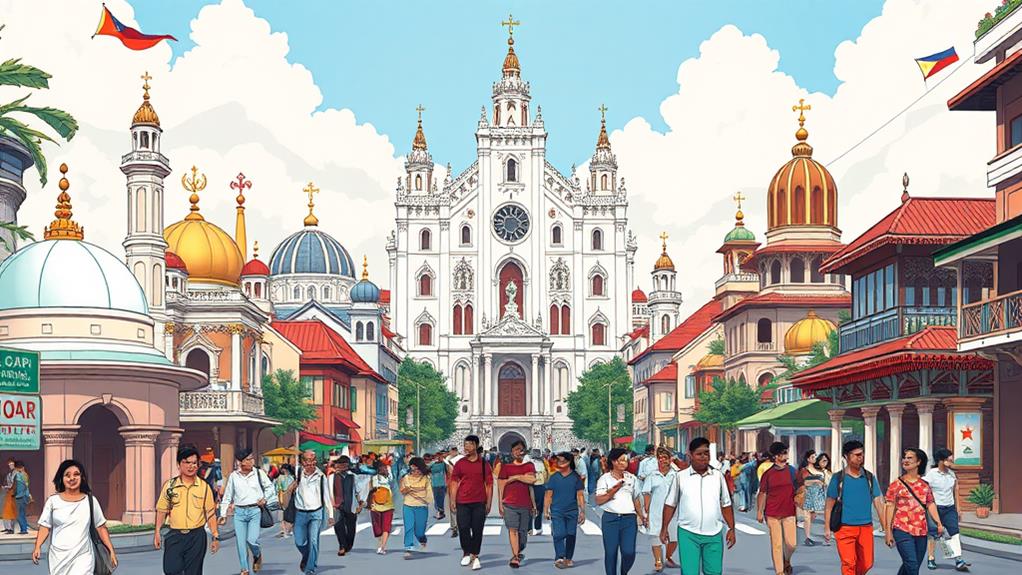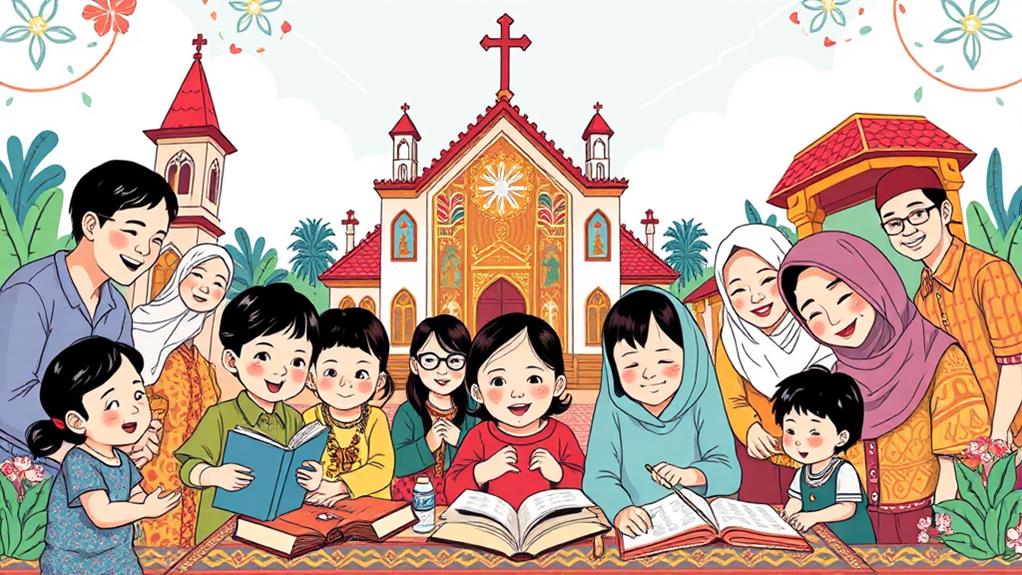Religion plays a vital role in shaping Filipino society. For centuries, the country's cultural identity has been influenced by a blend of indigenous beliefs, Catholicism, Islam, and other faiths. This unique fusion has resulted in a distinct cultural identity, values, and daily life practices.
Approximately 90% of the population identifies with a religious group, making religion an integral part of community life. In this complex web of beliefs and practices, you'll find intersections with psychology, culture, and politics. For instance, the Catholic Church has historically played a significant role in shaping the country's education system, healthcare, and social services.
Syncretism, the blending of different religious beliefs and practices, is a common phenomenon in the Philippines. For example, the Filipino celebration of All Saints' Day, a Catholic tradition, has incorporated indigenous practices such as offering food and drinks to the spirits of ancestors. This blending of beliefs has resulted in a unique cultural identity that is distinct from its Asian neighbors.
Religion also influences daily life in the Philippines, with many Filipinos attending religious services regularly and participating in religious festivals and celebrations throughout the year.
In addition, religious beliefs and values shape personal and social relationships, influencing moral codes and social norms.
Historical Development of Religion

The Philippines' religious landscape has been shaped by a mix of indigenous and foreign influences.
Before foreign religions arrived, indigenous beliefs centered around a pantheon of gods and spirits were practiced.
The introduction of Islam in 1350 and Catholicism in 1565 significantly altered the religious affiliation of the Filipino people.
During the Spanish colonial period, Catholicism became the dominant religion and greatly influenced Filipino culture and community life. The Church played a crucial role in shaping the country's social and political structures.
In Mindanao, Islam established itself as a significant force, particularly in the southern regions.
Later, American colonization introduced Protestantism, which further diversified the country's religious landscape.
Today, Catholicism, Islam, and Protestantism are the dominant religions in the Philippines, each with its unique impact on Filipino society.
Cultural Insights and Syncretism
Religion plays a significant role in shaping the Filipino cultural identity. This is evident in the syncretism between indigenous beliefs and Christianity, which is reflected in various cultural practices. For example, many festivals in the Philippines blend Catholic traditions with local customs.
Fiestas celebrating patron saints often include indigenous rituals, showcasing the dynamic nature of Filipino spirituality.
The intersection of religion and psychology shapes Filipino cultural identity. Historical references, such as Filipino Religious Psychology, explore this intersection and reflect a blend of spiritual influences.
Local mythological beliefs are preserved and celebrated in works like Creatures of Philippine Lower Mythology, highlighting the persistence of indigenous spirituality alongside dominant religious practices.
This cultural adaptation promotes community bonding through shared rituals and celebrations, reinforcing cultural identity among Filipinos. The influence of both Catholicism and indigenous beliefs has created a unique cultural tapestry, woven from the threads of spiritual influences, rituals, and celebrations.
Contemporary Religious Landscape

The Philippines is a predominantly Christian country, with approximately 90% of its population identifying with a religious group.
The Roman Catholic Church is the largest religious group, with around 79% of Filipinos adhering to Catholicism. Other Christian denominations, such as the Iglesia ni Cristo and the Philippine Independent Church, make up about 9% of the population, contributing to the country's religious diversity.
A significant minority of Filipinos practice Islam, with around 5-6% of the population identifying as Muslim.
Most Muslims reside in the southern regions of Mindanao, Sulu, and Palawan, where they maintain distinct cultural and religious practices.
Indigenous religions, such as Anitism or Bathalism, are also present, although practiced by a small percentage of the population.
These religions are characterized by rituals honoring ancestors and nature.
The coexistence of traditional beliefs and modern influences has led to a unique syncretism within various communities, highlighting the complexity of the Church and state relationship in the Philippines.
Current Issues and Socio-Political Context
The religious landscape of the Philippines is complex and influenced by historical, cultural, and political dynamics.
The Catholic Church's involvement in political activism, such as the People Power Revolution, has shaped the country's political narrative. This involvement has led to ongoing tensions between the government and Muslim communities in Mindanao, which stem from historical grievances and the impact of colonialism on religious identities.
The Catholic Church's social justice initiatives focus on addressing poverty, human rights, and environmental protection. These initiatives often lead to friction with government authorities, as the Church's advocacy for social change can be seen as a challenge to the government's authority.
Since the 1990s, the formal separation of church and state has allowed for greater religious pluralism, but the Catholic Church remains a dominant force in shaping societal norms and values.
In recent years, emerging fundamentalist groups and small sects, particularly in areas like Cebu City, have challenged the Catholic Church's supremacy. This shift indicates a changing landscape of religious influence and community engagement in contemporary Filipino society.
How has the history and traditions of Islam influenced the role of religion in Filipino society?
The rich and diverse tradition of Islam has significantly influenced the role of religion in Filipino society. The historical and cultural impact of Islam in the Philippines has led to the integration of Islamic practices and beliefs into the country’s religious landscape, resulting in a unique blend of traditions and customs.
Educational Opportunities and Community Engagement

The Catholic Church's educational initiatives in the Philippines extend beyond academic learning to instill moral values and principles in students. These initiatives focus on moral education, emphasizing the importance of Christ's teachings and God's love in shaping individuals' values and principles.
The Church's educational programs promote community engagement and social activism through various initiatives. Faith-based exhibitions and workshops encourage cultural understanding, global learning, and community engagement, fostering harmony among diverse religious communities.
Interfaith dialogue programs promote understanding, respect, and cooperation among religious groups, strengthening community development and social activism. Disaster relief efforts provide educational resources, support, and aid to affected communities, enhancing the Catholic Church's role in community development and social service.
Through these initiatives, the Catholic Church demonstrates its commitment to community development, social activism, and disaster relief in Filipino society.
Frequently Asked Questions
Why Is Religion so Important in the Philippines?
Religion plays a vital role in Filipino life because it brings people together and strengthens community bonds. Faith practices and religious festivals unite individuals, reinforcing their spiritual identity and providing moral guidance. For instance, the Filipino tradition of Simbang Gabi, a series of nine dawn Masses before Christmas, is a time for families and friends to come together and celebrate their faith.
Historical influences have shaped the country's religious identity. The Philippines was colonized by Spain, which introduced Christianity, and later by the United States, which brought Protestantism. These influences have contributed to the country's diverse religious landscape. Today, approximately 86% of Filipinos identify as Catholic, while others practice Protestantism, Islam, and indigenous religions.
Interfaith dialogue and charitable activities foster unity among Filipinos. For example, the Philippine Interfaith Movement, a network of religious leaders and organizations, promotes dialogue and cooperation among different faith groups. This unity is crucial in times of crisis, such as natural disasters, when Filipinos come together to provide aid and support.
Religion is a vital part of Filipino culture because it provides a sense of community and social cohesion. By participating in religious festivals and traditions, Filipinos express their cultural identity and strengthen their bonds with one another.
In the Philippines, religion isn't just a personal belief, but a way to connect with others and build a stronger community.
What Is the Main Role of Religion in Society?
Religion provides spiritual guidance and a moral framework for individuals. This guidance helps individuals navigate life's challenges and make informed decisions. For instance, religious teachings often emphasize the importance of honesty, compassion, and fairness, which shape an individual's moral character.
Religion fosters community cohesion by bringing people together. It creates a sense of belonging among followers, who share common beliefs and values. This shared identity facilitates social support, as individuals can rely on their religious community for emotional support, advice, and assistance.
Religion plays a significant role in identity formation. It helps individuals understand their purpose, values, and beliefs, which in turn shape their sense of self. For example, a person's religious beliefs may influence their career choices, relationships, and overall lifestyle.
Religion facilitates conflict resolution by promoting forgiveness and understanding. It encourages individuals to resolve conflicts peacefully, rather than resorting to violence or aggression. This is achieved through teachings that emphasize empathy, tolerance, and compassion.
Religion promotes cultural preservation through charitable activities. It encourages individuals to engage in acts of kindness, such as volunteering, donating to charity, and participating in community service. These activities help preserve cultural heritage and promote social welfare.
Religion establishes ethical standards for individuals. It provides a set of principles that guide individuals' behavior, ensuring they act with integrity and respect for others. These standards promote personal fulfillment, as individuals strive to live up to their religious ideals.
What Is the Cultural Role of Religion in Society?
Religion plays a significant role in shaping spiritual identity by fostering community bonding through shared moral values and cultural traditions.
For instance, many religions have customs and practices that bring people together, such as attending church services or participating in religious festivals.
Religion promotes social cohesion by providing a framework for conflict resolution and inspiring charitable works.
For example, many religious organizations offer counseling services to help individuals resolve conflicts, and they also engage in charity work to support those in need.
Religion influences family dynamics by providing guidance on values and morals, which helps to strengthen family bonds.
Additionally, religious practices and rituals, such as prayer or meditation, can bring families closer together.
Religion provides a sense of personal fulfillment by giving individuals a sense of purpose and direction.
For example, many people find comfort and solace in their religious beliefs during difficult times, which helps them to cope with stress and anxiety.
What Role Did Religion Play in Spanish Colonization in the Philippines?
Religion played a crucial role in Spanish colonization in the Philippines. The Spanish colonizers imposed Catholicism on the population through missionary activities and conversion efforts. This led to cultural assimilation and religious syncretism, where indigenous beliefs blended with Catholicism.
As a result, a unique social hierarchy emerged, with the Church holding significant influence over colonial power.
For example, Catholic friars built churches and established missions, converting many Filipinos to Catholicism.
The Church's influence extended to education, as Catholic schools and universities were built to spread Catholic teachings. This blending of indigenous beliefs with Catholicism also led to the creation of unique cultural practices, such as the celebration of Catholic holidays like Christmas and Easter, alongside indigenous traditions.
However, not all Filipinos accepted Spanish colonization and Catholicism. In the Muslim south, resistance movements emerged, pushing back against Spanish dominance.
These resistance movements left a lasting legacy on the Philippines' cultural identity.